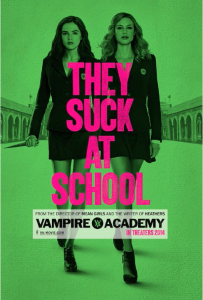
SteveMcCabe.net...
...being the online presence of Steve McCabe himself
On Vampire Academy, and why some things are best left well alone.
February 26th, 2014The fact that I confused Vampire Academy with Vampire Diaries probably should have been the clue I needed to realise that this wasn’t about to be the best film I’ve ever seen, or indeed the best film I’ve seen this month (that honour goes to 12 Years a Slave. Obviously.).
The film had promise, though: director Mark Waters made Mean Girls, and his brother Daniel, who wrote the screenplay, also wrote Heathers. One can only imagine studio execs positively wetting themselves with glee at the thought of the creators of two classic high-school comedies making a vampire high-school comedy — Heathers with Fangs, perhaps, or Mean Vampires.
If only. Turns out, Daniel Waters also wrote Hudson Hawk, and, to be fair, that’s probably a better point of reference than the truly superb Heathers. That would explain, then, why the dialogue was as clangingly cringe-inducing as it managed to be so very often. One character, we find, has been sequestered away from the world for several years; the most insightful question he can find to ask is “What’s a hashtag?” Zeitgeist, or what? Only the reference to the blood-feeding human who writes Twilight fan fiction was more clunkingly knowing and clever-clever.
But, despite the dismal screenplay, and the planktastic acting that delivered it — Lucy Fry, mouth-breathing her way through the film looking like a Spitting Image puppet, really might want to take a long, hard look at other careers after this — there was, potentially, the germ of a good idea in the film, based as it is on a series of books that are, I gather, rather popular among the younger set, something between Heathers (sorry to keep referencing it, but Mr. Waters has, rather, built something of a rod for his own back with that gem) and Twilight, but, sadly, by shooting for two targets at once, Vampire Academy has failed to hit either.
One massive problem was the film’s basic conceit. The concept of the vampire is so fundamentally entrenched, the mythology so utter established, that if you’re going to re-write it, then you need something very, very powerful to back it up. Vampire Academy revolves around three classes of vampires — or are they? — that are so at variance with what anyone else would recognise as vampires in any other established vampire world, from Bella Lugosi to True Blood, that a rather extensive expository voice-over is required at the beginning of the film to explain to us what Dhampirs, Moroi and Strigoi are. To be fair, the voice-over is delivered by Zoey Deutch, who does a tolerable job of delivering the lines she’s given — “a few corpuscles short of an artery?” Really? Trite, clichéd lines like this only serve to draw attention away from the fact that a filmmaker cannot simply redefine a creature as strongly defined as a vampire. But Vampire Academy’s vampires — the Dhampirs and Moroi, at least — aren’t immortal, aren’t vulnerable to sunlight. So not really vampires, then. Sorry, but you don’t get to rewrite a mythology unless you replace it with something at least equally compelling, and Vampire Academy simply doesn’t manage. I suppose “Not quite vampires but something somewhat similar, but without the dark, sinister heritage and menace Academy” wouldn’t have fit on the posters.
The rest of the cast struggle along gamely. Sarah Hyland, Modern Family’s Hayley, plays, well, Hayley, when she’s not being Michelle from American Pie. Joely Richardson could be worse, and Claire Foy, presumably, had the word eccentric written in large letters on her script, just to flag up quite clearly how she was to play her character. Still learning his trade — and, indeed, to speak English — is Danila Kozlovsky, whose delivery suggests only a passing familiarity with the language.
It is, I know, customary in a film review to make reference to the story. But the story, such as it is, of Vampire Academy was so slight, and so poorly developed, that I’ll pass. If the scriptwriter can’t be bothered to write a decent story, I’m not going to bother trying to explain what story there is in a review.
Given the pedigree of this film, it should have been so very much better. That it wasn’t makes one suspect that Heathers was, indeed, a one-off. A shame, really — Vampire Academy ends up feeling like more a wasted opportunity than the classic it might possibly have been.

Leave a Reply